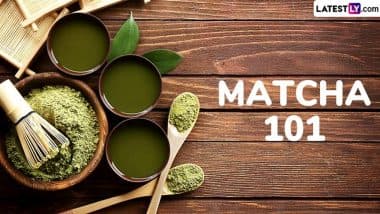Matcha—seems like the latest obsession of the ‘green’ beverage has taken over the moodboards of food lovers. The matcha ingredients are popping up everywhere, in lattes, ice cream, smoothies, icing and more. In Mumbai alone, cafes in Bandra are even hosting matcha workshops where people are showing up in great enthusiasm for the whisk magic and fun conversations. The obsession over matcha is real! But what really is matcha? Is it healthier than coffee or tea? Does it contain caffeine? Fret not, beginners! Here’s Matcha 101 essential guide for you. The matcha obsession does not seem to be a passing trend; it’s a restorative addition to our routines, and it is here for the long run.
What Is Matcha?
Matcha is a powdered green tea from the plant Camellia sinensis, mainly grown in Japan. The green tea powder is whisked into hot water to form a frothy drink. The act of preparing, presenting, and sipping matcha makes the experience meditative.
Matcha is typically sold in two different grades—ceremonial grade and culinary grade. Ceremonial grade is the highest quality matcha extracted from the most carefully cultivated buds and leaves. This kind is meant to be enjoyed on its own, with no other sweeteners, to really appreciate and enjoy the earthy flavour of matcha. On the other hand, the culinary grade matcha has a more robust flavour that can stand up to other ingredients it's paired with. This may include ground leaves with some stems and veins attached. Culinary-grade matcha can also be whisked into tea, and it's great to mix with milk for lattes or spirits for cocktails.
Does Matcha Contain Caffeine?
The caffeine content of matcha varies based on the type of leaves, how much powder you use to make the tea and the brewing time. You will be surprised to know that matcha has more caffeine content than green tea, similar to black tea, but less caffeine than brewed coffee. The tea leaves tend to retain more of their caffeine content. But a specific level of caffeine per cup of matcha tea depends on how the matcha is processed and prepared.
Matcha Health Benefits
- Regular green tea is touted as an antioxidant powerhouse, but matcha has even more benefits. While making green tea, you steep the leaves in hot water and then discard them. But when you make matcha, you whisk the powder into hot water or milk. As a result, the antioxidants in matcha are higher.
- Matcha's antioxidants help lower blood pressure, reduce the risk of heart disease, and even boost metabolism.
Several components in matcha could help enhance brain function.
- Drinking green tea has been linked with a lower risk of cardiovascular disease compared with coffee. The compounds in matcha are similar to those in green tea, and researchers have often suggested that it may have similar benefits.
Despite its potential health benefits, it is best to consume matcha in moderation. For beginners, buying matcha for the first time can be confusing. However, the most significant distinction is between ceremonial and culinary grade matcha. While the ceremonial kind is pricier, it has a mellow flavour.
(The above story first appeared on LatestLY on Jun 05, 2025 06:49 PM IST. For more news and updates on politics, world, sports, entertainment and lifestyle, log on to our website latestly.com).













 Quickly
Quickly


